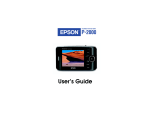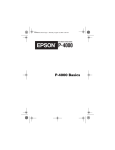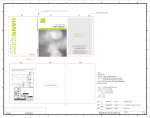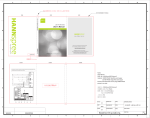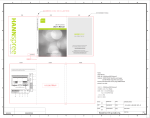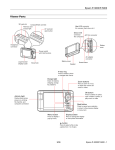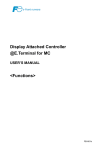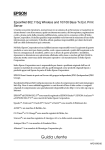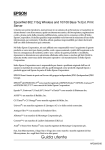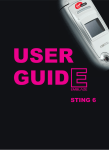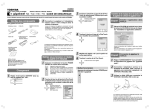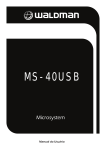Download Epson P-2000 Basic Guide
Transcript
P-2000 Basics COPYRIGHT NOTICE All rights reserved. No part of this publication may be reproduced, stored in a retrieval system, or transmitted, in any form or by any means, electronic, mechanical, photocopying, recording, or otherwise, without the prior written permission of Seiko Epson Corporation. The information contained herein is designed only for use with this Epson product. Epson is not responsible for any use of this information as applied to other equipment. Neither Seiko Epson Corporation nor its affiliates shall be liable to the purchaser of this product or third parties for damages, losses, costs, or expenses incurred by the purchaser or third parties as a result of accident, misuse, or abuse of this product or unauthorized modifications, repairs, or alterations to this product, or (excluding the U.S.) failure to strictly comply with Seiko Epson Corporation’s operating and maintenance instructions. Seiko Epson Corporation shall not be liable for any damages or problems arising from the use of any options or any consumable products other than those designated as Original Epson Products or Epson Approved Products by Seiko Epson Corporation. TRADEMARKS Epson and Epson Print Image Framer are registered trademarks and Photo Fine and P.I.F. are trademarks of Seiko Epson Corporation. Epson Store and Epson Connection are service marks of Epson America, Inc. General notice: Other product names used herein are for identification purposes only and may be trademarks of their respective owners. Epson disclaims any and all rights in those marks. © 2005 Epson America, Inc. 2/05 2 CPD-18999R1 Contents Contents 3 Introduction 5 About the Software Replacement Battery 6 6 Getting Started 7 Unpacking Your P-2000 P-2000 Lights and Buttons Installing the Battery Charging the Battery Turning Your P-2000 On and Off Setting the Language, Date, and Time Conserving Battery Power Using the Home Screen Installing the Software 7 8 9 10 12 12 14 15 16 Viewing and Playing Photos, Video, and Music 17 Inserting and Removing Memory Cards Copying Files from a Memory Card Supported File Formats Browsing Files on a Memory Card 17 21 24 26 3 Using the P-2000 Screen Viewing Images Playing Video and Audio Files Copying Files to and From Your Computer 28 30 35 36 Creating Custom Albums and Slide Shows 39 Creating an Album Creating Custom Slide Shows with Music Showing Photos and Videos on TV 39 45 47 Solving Problems 49 Power Problems Viewing Problems File Operation Problems Where To Get Help 49 49 50 51 Appendix 53 Important Safety Instructions FCC Compliance Statement Declaration of Conformity MPEG License Agreement Epson America, Inc. Limited Warranty 53 59 60 61 61 Index 65 4 Introduction Your new Epson® P-2000 multimedia storage viewer lets you enjoy photos, videos, and music wherever you go. Its features include: ◗ Large, high-quality 3.8-inch LCD with Photo Fine™ technology ◗ Support for JPEG files and RAW files from select digital SLR cameras ◗ MP3 and AAC audio ◗ MPEG4 and Motion JPEG video ◗ 40GB hard drive ◗ Two slots for CompactFlash® and SD™ (Secure Digital) memory cards ◗ Hi-speed USB 2.0 interface for PC or Macintosh® ◗ Direct printing to select Epson printers ◗ Lithium ion battery and AC adapter ◗ VGA output to display pictures on a TV or projector 5 About the Software The CD-ROM that came with your P-2000 includes the following software for Windows® and Macintosh:® ◗ Your Epson P-2000 User’s Guide, which has instructions for all the features of your P-2000, including printing directly from the P-2000. ◗ A USB driver that lets you transfer files to and from your computer in Windows 98SE. (If you have a newer version of Windows or a Macintosh, you don’t need to install the USB driver.) ◗ Adobe® Acrobat® Reader to view the P-2000 User’s Guide. See page 16 for instructions on installing the software. Replacement Battery You can purchase a replacement lithium ion battery (B32B818252) from an Epson authorized reseller. For product information and to find the nearest authorized reseller, please call 800-GO-EPSON (800-463-7766) or browse our catalog of products at www.epson.com, select the product you are interested in, and click “Where to Buy.” To purchase online, please visit the Epson Store at www.epsonstore.com (U.S. sales only). In Canada, please call 800-463-7766 for a reseller referral. 6 Getting Started Follow the instructions in this section to install the batteries and software and get ready to use your P-2000. Unpacking Your P-2000 Epson P-2000 Viewing stand Software CD-ROM Lithium-ion battery Carrying case USB cable Strap AC adapter and power cord 7 P-2000 Lights and Buttons Print button Displays the Print menu. Charge light Access light Turns green when the battery is being charged. Menu button Displays the Pop-up menu. Flashes orange when you turn on the P-2000 or access files. 4-way ring Press to select a photo or an option in a menu. OK button Selects an option, opens a folder or photo, and zooms into an image. Activity light Flashes blue during power on, printing, and certain other operations. Cancel button Cancels the current operation and returns to the previous screen. Display button Displays information, instructions, or messages. Home button Returns to the Home screen. 8 Installing the Battery 1 Turn the P-2000 upside down. 2 Slide the battery cover to the left to open it. 3 Insert the battery into the compartment with the gold contacts going in first. 9 4 Close the battery cover and slide it to the right until BATT. it clicks. Charging the Battery After installing the battery, you need to charge it using the AC adapter. When the power is off, it takes about 3 hours to fully charge the battery. With the power on, it takes longer. The Charge light is green while the battery is being charged. When the battery is fully charged, the light turns off. 10 To charge the battery, connect the AC adapter as shown below. Connect the other end to the power cord, and plug it in to an electrical outlet. Caution: Do not connect the AC adapter when the battery is not installed; this can damage the P-2000. Do not remove the AC adapter while you are using the P-2000. The battery status is displayed in the top right corner of the screen when the P-2000 is on. : Battery is fully charged. : Battery power is about half full. : Battery power is low. : : Battery power is running out. Charge the battery using the AC adapter. Battery is charging. 11 Turning Your P-2000 On and Off ◗ To turn on the P-2000, slide the Power switch down and release it. The blue activity light turns on. ◗ To turn off the P-2000, make sure the Access light is off. Then slide the P power switch down and hold it until the Access light flashes. Access light Activity light Setting the Language, Date, and Time When you turn on the P-2000 the first time, you see the language setting screen: Language setting English (Intl.) Francais 12 Deutsch Italiano Espanol Nederlands 1 Press the OK button to select English. You see a message about setting the date. 2 Press the OK button. You see the Date and Time screen: Date and time Year 2004 Month Jul Day 26 Hour 13 Minute Date Format 07 YYYYMMDD 3 Press right or left on the 4-way ring to change the value for the selected item. 4 To go to the next item, press 4-way ring down on the 4-way ring. Then press right or left to change that setting. 5 After you complete the settings, press the OK button. You see the Home screen. See page 15 for details. 13 Note: If you remove the battery, the date and time settings will be erased after about one day. The next time you turn on the P-2000, the date and time setting screen will be displayed. If you want to change the settings at any time, select Settings on the Home screen, then select Date and Time. Conserving Battery Power To conserve battery power and protect the LCD screen, the P-2000 has two power-saving features. If no button has been pressed and there has been no activity for 10 minutes, the backlight on the LCD screen is turned off. After 15 minutes, the power is turned off. Note: You can change the number of minutes for these settings; select Settings on the Home screen, then select Power Save. ◗ If the screen goes dark because the backlight is turned off, press any button on the P-2000 to turn it back on. ◗ If the P-2000 has been powered off, you need to turn it back on with the P power switch. Note: The power is also turned off if the P-2000 gets too hot. If this happens, let it cool before turning it back on. 14 Using the Home Screen Whenever you turn on the P-2000, the Home screen appears. You can return to the Home screen at any time by pressing the Home button. Use the 4-way ring to highlight one of the icons, then press the OK button to select it. View folders for all your saved files View or copy files from a memory card View your albums Battery status Home Saved Data Albums Memory Card See page 43 to create album shortcuts here Latest Data View most recently saved files Settings Customize your P-2000 and check storage space 15 Installing the Software Make sure you install the software on your computer from the CD-ROM that came with the P-2000. 1 Insert the software CD-ROM in your computer’s CD-ROM or DVD drive. 2 Open the CD-ROM and double-click the Epson icon if necessary. You see the license agreement. 3 Read the license agreement, then click Agree. You see the Software Installation screen. 4 If you don’t have Adobe Acrobat Reader on your system, click the box to select it. 5 Click Install, then follow the on-screen instructions. Enter your administrator name and password if necessary. If you see a message asking you to restart, select No, I will restart my computer later, and click Finish. 6 When installation is complete, click Exit. 7 When you see the product registration screen, register your P-2000 as instructed. At the last screen, click Done or close your browser. 16 Viewing and Playing Photos, Video, and Music Follow the instructions in this section to insert a memory card, copy files, and view or play them on your P-2000. Inserting and Removing Memory Cards The P-2000 has two memory card slots. The C/F Card slot supports the following cards: ◗ CompactFlash, Type I and II ◗ Microdrive™ (3.3V) The SD Card slot supports the following cards: ◗ SD card (Secure Digital) up to 512MB ◗ MultiMedia card (MMC V 2.1 or later) up to 512MB You can also use the following types of memory cards with a CompactFlash adapter in the C/F Card slot: ◗ Memory Stick® ◗ SmartMedia™ (3.3 V only) ◗ xD-Picture card™ 17 Caution: Never remove a memory card while the Access light is flashing. Doing so may cause files to be lost or damaged. Do not put labels or stickers on memory cards. The sticker may peel off, preventing the card from being ejected and damaging the P-2000. Using the CompactFlash Card Slot Insert the memory card into the slot with the back of the card facing the screen. Then push the memory card all the way into the slot. Back of card If you are using a CompactFlash adapter, put the card into the adapter and insert the adapter into the slot. Caution: Make sure you insert memory cards in the correct orientation. Otherwise, the card and P-2000 may be damaged. 18 To remove a card from the C/F Card slot, first make sure the Access light is off. Then press the eject button and pull out the card. If the button is not sticking out, press it once to pop it out, then press it again to eject the card. Note: If you are using a CompactFlash adapter, remove the adapter from the P-2000; do not remove only the memory card. 19 Using the Secure Digital Card Slot Insert the memory card into the slot with the back of the card facing the LCD. Then push the memory card all the way into the slot. Back of card Caution: Make sure you insert memory cards in the correct orientation. Otherwise, the card and P-2000 may be damaged. To remove a card from the SD Card slot, first make sure the Access light is off. Then press in on the top of the card. When the card pops out, pull it out of the slot. 20 Copying Files from a Memory Card After you insert a memory card, you can browse the files and decide what you want to do with them, or simply copy all the files on the card to the P-2000. 1 Insert the memory card as described on page 18 or 20. 2 Use the 4-way ring to highlight Memory Card on the Home screen and press the OK button. You see the following menu: Home Saved DataCopy Data from Albums Memory Card Memory Card Create Album After Copying Data Browse the Memory Card Latest Data Settings 21 3 Select what you want to do by pressing up or down on the 4-way ring. Then press the OK button. ◗ If you select Copy Data from Memory Card, copying starts and the following screen appears: Home Saved Data Albums Memory Card Copying data... Cancel Latest Data Settings The files are copied to a folder that is automatically created on the P-2000. The folder is named according to the date, for example 20041225.001. Folders are numbered in the order they are copied. 22 ◗ If you select Create Album After Copying Data, you can select an album or create a new one. See page 39 for instructions. ◗ If you select Browse the Memory Card, you see thumbnail images of the files on the card. See page 26 for more information about browsing. Deleting Files After Copying You can have files automaticaly deleted after you copy them to the P-2000. 1 On the Home screen, use the 4-way ring to select Settings and press the OK button. 2 Select Copy Mode and press the OK button. 3 Press left or right on the 4-way ring to choose one of the following settings: ◗ Select Delete if you want files on memory cards to be automatically deleted, without a warning message, after you copy them. ◗ Select Confirm before deleting if you want the P-2000 to ask before copying whether to delete the files from the memory card after copying. 4 When you are finished, press the OK button. 23 Supported File Formats The P-2000 supports non-progressive JPEG files, and RAW files from the following digital SLR cameras: Epson R-D1; Canon® EOS-D30, EOS-D60, EOS-D10D, Kiss Digital, and EOS-1D Mark II; Konica Minolta® Maxxum-7; Nikon® D100, D1H, D2H, and D70; and Pentax® *ist D and *ist DS. * Image files Extension Details JPEG .jpg .jpeg Minimum size: 160 × 120 pixels Maximum size: 17.8 megapixels* Maximum image aspect ratio: 8:1 RAW .cr2 .crw .erf .mrw .nef .pef JPEG data stored in the header of RAW files is displayed. Pixels refer to image resolution, not file size (bytes). The pixel size depends on the capability and settings of the camera used to capture the image, and whether you have resized the image in an image-editing program. Note: RAW files do not support direct printing, rotation, zooming, or slide shows. Rotation is also not supported for JPEG files larger than 8.9 megapixels. 24 The P-2000 supports video files in resolutions ranging from 160 × 112 pixels to 640 × 480 pixels, with file sizes up to 2GB. WMV, MPEG1, MPEG2, and DVD-Video are not supported. However, you may be able to convert files to supported formats using programs such as Apple® QuickTime™ Pro. Video file extensions Video codec Audio codec Max Bit rate .avi MPEG-4 (Simple Profile) AAC, MP3, ALaw, µLaw PCM, ADPCM 2.5 Mbps (ave.) (at 30 fps) Motion JPEG ALaw µLaw PCM 3 Mbps MPEG-4 (Simple Profile) AAC 2.5 Mbps (ave.) (at 30 fps) Motion JPEG ALaw µLaw PCM 3 Mbps .mp4 MPEG-4 (Simple Profile) AAC 2.5 Mbps (ave.) (at 30 fps) .asf MPEG-4 (Simple Profile) ADPCM 2.5 Mbps (ave.) (at 30 fps) .mov 25 The P-2000 supports audio files with sizes up to 100MB. Audio file extensions Audio codec Detail .m4a .aac AAC (MPEG4) Maximum bit rate: 320 kbps (48 kHz, 16 bit Stereo) .mp3 MP3 Browsing Files on a Memory Card After you select Browse the Memory Card, you see thumbnail images of the files on the card. DSC00331.JPG DSC00330.mpg DSC00329.JPG DSC00328.JPG DSC00327.JPG DSC00326.JPG DSC00325.JPG DSC00324.JPG DSC00323.JPG DSC00322.JPG DSC00321.JPG To move to the next screen of thumbnail images, press and hold down on the 4-way ring. Note: Although you can play audio and video files on a memory card, you will get better performance by copying them to the P-2000 before you play them. See page 35 for instructions. 26 To view an image full screen, use the 4-way ring to select the image you want, then press the OK button. Press right or left on the 4-way ring to display the next or previous image. When an image is displayed full screen, you can zoom in, view information about the image, or see a histogram, as described on page 32. You can also press the Menu button and do the following when viewing images on a memory card: ◗ View a slide show of images ◗ Lock an image to prevent deletion ◗ Copy or delete the current image, all images, or selected images See the P-2000 User’s Guide on the CD-ROM or on your computer for more information. 27 Using the P-2000 Screen After you have copied files from a memory card, you can view or play them in various ways. The following illustrations and tables identify the icons that appear on the screen: Battery status Albums PC_DATA folder Album set as a shortcut PC_DATA Scenery Flower Travel Album1 Travel2 New Album3 Photo Favorite Album4 A folder that includes audio 28 PC_DATA folder This is one of the default albums, which you use for copying files from your computer. Battery status See page 11 for information about battery status. Audio folder Only folders that do not include image or video files display this icon. Album shortcuts See page 43 for instructions on creating album shortcuts. Video Folder copied from a computer File with P.I.F.™ frame Audio file Unsupported data file Image selected for printing RAW file Locked file Unsupported image file . Images selected for printing The number next to the icon indicates the quantity. See the P-2000 User’s Guide for printing instructions. Audio and video files See page 35 to play audio and video. RAW files See page 24 for details about supported RAW files. Locked files Press the Menu button and select Lock to protect files from deletion. Files with P.I.F. frames P.I.F. (Print Image Framer®) lets you add frames to your images. Some Epson digital cameras support this feature. 29 Viewing Images You can view images in Saved Data or Albums as thumbnails or full-screen images. To display information or instructions, press the Display button. Information and instructions vary depending on the screen. Home Saved Data Albums Latest Data Memory Card Settings 1 Use the 4-way ring to select Saved Data or Albums in the Home screen, then press the OK button. You see folders or albums: Saved Data 30 20040829\002 20040827\001 20040820\001 20040818\003 20040815\001 20040813\001 20040810\002 20040805\001 20040801\005 20040720\002 20040715\003 20040630\001 Note: On the Saved Data screen, folders are displayed for every memory card. You can change the setting to display folders by date. Select Settings on the Home screen, then select View Mode. 2 Use the 4-way ring to select the folder or album containing the images you want to view, then press the OK button. Thumbnails of the images and other files are displayed: Saved Data / 2004.08.26 DSC00331.JPG DSC00330.mpg DSC00329.JPG DSC00328.JPG DSC00327.JPG DSC00326.JPG DSC00325.JPG DSC00324.JPG DSC00323.JPG DSC00322.JPG DSC00321.JPG To move to the next screen, press down on the 4-way ring and hold. 31 3 Use the 4-way ring to select the image you want to view, then press the OK button. The selected image is enlarged to fill the screen. Zooming an Image ◗ To zoom in on an image shown full screen, press the OK button. Keep pressing it to zoom in even further. ◗ To zoom out, press the Cancel button. Continue pressing it to zoom all the way out. ◗ To move around a zoomed image, use the 4-way ring. 32 Displaying Information To view information about a full-screen image, press the Display button. The following information is displayed: ◗ File name ◗ F-stop ◗ Camera model ◗ Shutter speed ◗ Date of photo ◗ Exposure bias ◗ Pixel size ◗ White balance ◗ Focal length ◗ Metering mode ◗ ISO speed rate ◗ Flash Viewing a Histogram When an image is displayed full screen, press the Display button twice to see a histogram that shows the photo’s distribution of highlights, shadows, and midtones. 33 Displaying Images as a Slide Show You can display JPEG images as a slide show. 1 Select the folder or album you want to display as a slide show. 2 Press the Menu button to display the pop-up menu: Albums Edit Album Name Set as Album Shortcut PC_DATA Lock Scenery Flower Travel Start Slide Show Sort by Album Name Copy to Memory Card Album1 Delete Album Travel2 New Photo Favorite Album3 Album4 3 Select Start Slide Show and press the OK button. The slide show starts. Note: You can select transition effects, timing, and background music for the slide show. See page 45 for details. 34 Playing Video and Audio Files Select the video or audio file that you want to play and press the OK button. Saved Data / 2004.08.26 DSC00331.JPG DSC00330.mpg DSC00329.JPG DSC00328.JPG DSC00327.JPG DSC00326.JPG DSC00325.JPG DSC00324.JPG DSC00323.JPG DSC00322.JPG DSC00321.JPG While playing audio, the screen turns off to conserve the battery. Press any button to turn it back on. ◗ To raise or lower the volume, press up or down on the 4-way ring. ◗ To pause the audio or video, press the OK button. Press it again to restart. ◗ To stop playing and return to the previous screen, press Cancel. ◗ To play the previous or next audio file, or to fast forward or rewind a video, press left or right on the 4-way ring. Note: Some files may not support fast forwarding and rewinding. 35 Copying Files to and From Your Computer You can connect the P-2000 to your computer using the USB cable that came in the box, and easily copy files back and forth. You should use the AC adapter when you connect the P-2000 to your computer. Note: If your computer uses Windows 98SE, you need to install driver software before you connect the P-2000. See page 16 for instructions. Connecting the P-2000 to Your Computer 1 Connect the AC adapter to the P-2000 and plug it in. Then turn on the P-2000 and your computer. Note: Make sure the P-2000 is at the Home screen. 36 2 Connect the USB cable to your computer. Then open the USB connector cover and connect the other end of the USB cable to the P-2000. The LCD turns off. Press any button to turn it on. 3 Select the EPSON_PV drive on your computer. From your computer, you will see an Albums folder and a Cards folder (corresponding to Saved Data on the Home screen). Do not change the names of these folders or any of their subfolders. To locate files in the Cards folder, you will need to open a series of subfolders. 4 Copy files only to the PC_DATA folder (within the Albums folder). If you copy files to any other folder, the P-2000 will not recognize the files. 37 The PC_DATA folder is one of the default albums on the P-2000; you cannot rename or delete it or create an album thumbnail for it. Disconnecting the P-2000 From Your Windows Computer 1 Click Unplug or Eject Hardware on the computer screen. 2 Turn off the P-2000 and remove the USB cable from your computer. 3 Remove the USB cable from the P-2000. Disconnecting the P-2000 From Your Macintosh 1 Drag and drop the P-2000 icon to the trash. 2 Turn off the P-2000 and remove the USB cable from your Macintosh. 3 Remove the USB cable from the P-2000. 38 Creating Custom Albums and Slide Shows You can save your files in albums for special purposes, such as portfolios. You can also create slide shows with custom transitions and your own music. To share your images, slide shows, and videos with a larger audience, you can connect the P-2000 to a TV or projector. Creating an Album 1 Open a folder in Saved Data and select a file to include in the album. 2 Press the Menu button to display the pop-up menu, then select Copy to Album. Saved Data / 2004.08.26 Copy to Album Set as Folder Thumbnail DSC00331.JPG Lock DSC00329.JPG DSC00328.JPG Start Slide Show Copy to Memory Card Print Order Delete DSC00326.JPG DSC00325.JPG DSC00327.JPG DSC00324.JPG DSC00323.JPG DSC00330.mpg DSC00322.JPG DSC00321.JPG 39 3 Press the right side of the 4-way ring. The sub-menu appears: Saved Data / 2004.08.26 Copy to Album Set as Folder Thumbnail DSC00331.JPG Lock DSC00330.mpg This Data All DSC00329.JPGSelect DSC00328.JPG Start Slide Show Copy to Memory Card Print Order Delete DSC00327.JPG DSC00326.JPG DSC00325.JPG DSC00323.JPG DSC00322.JPG DSC00321.JPG DSC00324.JPG 4 Do one of the following, then press the OK button: 40 ◗ If you want to copy only the selected file to an album, select This Data. ◗ If you want to copy all the files in the folder, select All. ◗ If you want to select the file(s) to be copied, select Select. If you choose Select, files in the folder are displayed as thumbnails. Select Image for Album DSC00331.JPG DSC00330.mpg DSC00329.JPG DSC00328.JPG DSC00327.JPG DSC00326.JPG DSC00325.JPG DSC00324.JPG Press Menu to finish selection Select each file you want to copy and press the OK button. The selected files are displayed with a check mark. After selecting all the files you want to copy, press the Menu button. 5 Do one of the following: ◗ If you want to use an existing album, select the one you want and press the OK button. The files are copied. ◗ If you want to create a new album, select New, press OK, then select the name and press OK again. The files are copied. 41 ◗ If you want to create an album with a new name, select New and press the OK button. Then continue with the next step. Saved Data / 2004.08.26 Please select an album DSC00331.JPG New DSC00330.mpg PC_DATA Scenary Flower Travel DSC00327.JPG DSC00326.JPG Album1 Travel2 DSC00323.JPG DSC00322.JPG DSC00329.JPG DSC00328.JPG DSC00325.JPG DSC00324.JPG DSC00321.JPG 6 Select Input name and press the OK button. The on-screen keyboard appears: Saved Data / 2004.08.26 T DSC00330.mpg CAPS DSC00331.JPG A B C D DSC00329.JPG DSC00328.JPG BACKSPACE E F G 1 2 3 H I J K L M N 4 5 6 O P Q R S T U 7 8 9 DSC00327.JPG V W DSC00326.JPG X Y Z Cancel DSC00323.JPG DSC00322.JPG _DSC00325.JPG 0DSC00324.JPG OK DSC00321.JPG 7 Select a letter by using the 4-way ring, then press the OK button to input the selected letter. 42 ◗ To switch the letters between uppercase and lowercase, select CAPS and press the OK button. ◗ To delete the last letter input, press the Cancel button or select BACKSPACE on the screen and press the OK button. ◗ To delete everything that was input, select Cancel on the screen and press the OK button. 8 After you input the name, select OK on the screen by using the 4-way ring and press the OK button to save it. Files are copied to the new album. Creating an Album Shortcut You can create shortcuts on the Home screen to allow quick and easy access to three of your favorite albums. 1 Select the album that you want a shortcut for. 2 Press the Menu button to display the pop-up menu: Albums Edit Album Name Set as Album Shortcut PC_DATA Lock Scenery Flower Travel Start Slide Show Sort by Album Name Copy to Memory Card Album1 Delete Album Travel2 New Photo Favorite Album3 Album4 43 3 Select Set as Album Shortcut and press OK. The icon is displayed on the album thumbnail. Note: You can also press the Menu button to change the album name, lock, delete, or copy the album to a memory card, or sort albums. For more information, see the P-2000 User’s Guide on the CD-ROM or on your computer. Rotating Images You can rotate images that are stored in albums. 1 Press the Menu button to display the pop-up menu, then select Rotate. 2 Press right on the 4-way ring. The sub-menu appears. 3 Select Right to rotate the image 90° clockwise or Left to rotate it 90° counterclockwise. Then press the OK button. If you want to rotate a group of images at the same time select Right-Select (to rotate clockwise) or Left-Select (to rotate counterclockwise). Select the images you want to rotate, then press the Menu button. The images are rotated. Note: You cannot rotate JPEG images larger than 8.9 megapixels. 44 Creating Custom Slide Shows with Music You can create slide shows of all the images in a folder or album. You can choose from 5 different transition effects and 5 different background music selections. You can also register up to 3 of your own music files to use for slide shows. Registering Slide Show Background Music You can register one of your own audio files to use as slide show background music. 1 Highlight the audio file you want to use. 2 Press the Menu button. You see the pop-up menu. 3 Select Register to Slide show BGM. 4 Press right on the 4-way ring. The sub-menu appears. 5 Select one of the User BGM choices. If three audio files are already registered, the new file will replace one of the existing files. 6 Press the OK button to register the file and exit the menu. 45 Creating the Slide Show You can create a slide show from images in a folder or album in the P-2000 or on a memory card. The easiest way to select files for your slide show is to copy them to an album. See page 39 for instructions. Then follow these steps to create a slide show and select transitions and music: 1 Highlight or open the album or folder you want to use for the slide show. 2 Press the Menu button. You see the pop-up menu. 3 Select Start Slide Show and press OK. The slide show begins. 4 Press the Menu button. You see the slide show popup menu. 5 Select Slide Show Effect and press right on the 4-way ring. Choose from one of the 5 transition effects and press the OK button. 6 Repeat step 4 and select Slide Show Duration. Press right on the 4-way ring and select the timing for each image: 3, 5, 10, or 30 seconds, or 1, 5, or 30 minutes. Then press OK. 46 7 Repeat step 4 again and select Slide Show BGM. Select one of the audio files you registered, or select from one of the 5 default music selections. Then press OK. If you don’t want music for your slide show, select None. After you press the OK button, your slide show plays with the transition effect, image duration, and music you selected. Note: You can also choose default slide show settings. Select Settings on the Home screen, then select Slide Show. Showing Photos and Videos on TV You can connect the P-2000 to a TV or projector and view your images, videos, and slide shows. You will need a camcorder to TV/VCR audio/video cable (A/V cable with a 3.5 mm mini-plug to 3 RCA phono plugs). You can purchase the cable at an electronics store. 47 Follow these steps to connect the P-2000 to your TV: 1 Connect the three RCA plugs to the video and audio IN jacks on your TV. 2 Connect the mini-plug on the other end of the cable to the A/V Out connector on the side of the P-2000. The P-2000 LCD screen turns off. 3 Set the TV to display video input from the P-2000. Note: Some TVs may crop your images on the top and bottom. You can now use all of the P-2000 controls to play slide shows, photos, and videos on your TV. 48 Solving Problems Before you call for help, check this list of common problems and possible solutions. For more troubleshooting tips, check the P-2000 User’s Guide on the CD-ROM or on your computer. Power Problems The power doesn’t turn on. ◗ The P-2000 may have shut off automatically to save power. Slide the P power switch down to turn the P-2000 back on. ◗ The battery may need recharging. Connect the AC adapter as shown on page 11. Viewing Problems The LCD screen is dark. ◗ The screen may have turned off automatically to save power. Press any button to turn the screen on. ◗ If you have connected the P-2000 to your TV or projector, the screen turns off. ◗ Try adjusting the screen brightness. Select Settings on the Home screen, then select LCD Brightness. 49 Images or videos are not displayed correctly, or sound doesn’t play correctly. ◗ Make sure the file format is supported. See page 24 for details about supported image file formats. For audio and video, make sure the bit rate and audio codec of your file are supported. See pages 24 to 26 for details about video and audio files. You may be able to convert files to supported formats with software such as QuickTime Pro. ◗ The file may be corrupted. ◗ Make sure the P-2000 is not connected to a computer or printer. Images are not displayed when the P-2000 is connected. File Operation Problems You have a problem copying files to or from the P-2000. ◗ Make sure you have sufficient space on the hard drive. To check the space remaining, select Settings on the Home screen, then select Hard Drive. ◗ Make sure files are not damaged or corrupted. ◗ If you want to copy files to or from a computer running Windows 98, you need to install driver software. See page 16 for instructions. 50 ◗ When transferring files from a computer, make sure the P-2000 is at the Home screen, and copy files to the PC_DATA folder within the Cards folder. ◗ To locate files in the Cards folder on the P-2000 (Saved Data) from your computer, you need to open a series of subfolders. See pages 36 to 38. You can’t rotate an image. The image must be a JPEG in the Albums folder, and it cannot be larger than 8.9 megapixels. Where To Get Help Epson provides technical assistance 24 hours a day through the electronic support services and automated telephone services listed below. Service Access World Wide Web From the Internet, you can reach Epson Support at http://support.epson.com. At this site, you can download drivers and other files, look at product documentation, access troubleshooting information, and receive technical advice through e-mail. Automated Telephone Services A variety of automated help services are available 24 hours a day, seven days a week. To use these services, you must have a touch tone telephone and call (800) 922-8911. 51 To speak to a technical support representative, dial: ◗ U.S.: (562) 276-4303, 6 AM to 6 PM, Pacific Time, Monday through Friday. ◗ Canada: (905) 709-3839, 6 AM to 6 PM, Pacific Time, Monday through Friday. Toll or long distance charges may apply. Please have the following information ready: ◗ Product name (Epson P-2000) ◗ Product serial number (on the back of the P-2000) ◗ Proof of purchase (such as a store receipt) and date of purchase ◗ Computer configuration and operating system version ◗ Description of the problem You can purchase parts, manuals, and accessories from an Epson authorized reseller. For product information and to find the nearest authorized reseller, please call 800-GO-EPSON (800-463-7766) or browse our catalog of products at www.epson.com, select the product you are interested in, and click “Where to Buy.” To purchase online, please visit the Epson Store at www.epsonstore.com (U.S. sales only). In Canada, please call 800-463-7766 for a reseller referral. 52 Appendix Important Safety Instructions Using the P-2000 ◗ Follow all warnings and instructions marked on this product. ◗ Use only AC adapter model A351H and Lithium ion battery model EU-97 with this product. ◗ When connecting this product to a computer or other device with ◗ ◗ ◗ ◗ ◗ ◗ ◗ ◗ a cable, ensure the correct orientation of the connectors. Each connector has only one correct orientation. Inserting a connector in the wrong orientation may damage both devices connected by the cable. Do not insert objects into the slots or openings on this product. Do not touch the components inside this product unless instructed to do so in the documentation. Never force this product’s components into place. Although this product is designed to be sturdy, rough handling can damage it. Never spill liquid onto this product. If this product emits unusual noises, odors, or smoke, cancel the current operation and turn it off immediately. Disconnect the AC adapter from the product, then unplug the AC adapter from the power outlet. Contact Epson. Do not use this product after moving it between extreme temperatures, which may cause condensation to form on electronic parts. If you use this product in places where the use of electronic devices is limited, such as in airplanes or hospitals, follow all instructions in those places. Do not use this product outdoors during a thunderstorm. To prevent fire or electric shock, do not cover this product with a blanket or other covering that may give off a static electric shock. 53 ◗ To prevent fire or electric shock, do not expose this product or its options to rain or moisture. ◗ To prevent fire or explosion, do not use this product where flammable or volatile gas is stored. Using the Battery ◗ If battery acid gets into your eyes or on your skin, immediately ◗ ◗ ◗ ◗ ◗ ◗ ◗ ◗ ◗ ◗ ◗ ◗ ◗ ◗ rinse the affected area thoroughly with water and seek medical treatment. If a battery is swallowed, seek medical treatment immediately. Use only an Epson Lithium-ion battery for the P-2000 according to the instructions in this manual. Use only AC adapter model A351H and P-2000 (Model G941) to charge batteries. Do not use the battery that comes with this product for other devices. To protect against short-circuiting, do not remove the outside sleeves of the battery. Do not handle the battery with wet hands or use it near water. Do not expose the battery to water or high humidity. Do not drop, puncture, disassemble, mutilate, or short-circuit the battery. Do not place the battery near or into fire or water. Do not use batteries that are leaking or damaged in any way. Do not charge the battery on devices except this product. Do not charge the battery near open flame or in very hot locations. Keep batteries away from heat sources. Do not leave the battery in a vehicle to prevent the battery from overheating. Do not insert objects into any openings as they may touch dangerous voltage points or short-circuit components. 54 ◗ Prevent the battery from coming into contact with metal objects that could short-circuit it, such as coins or keys. ◗ Do not insert the battery into power outlets or other power sources such as car cigarette lighter sockets. ◗ Do not solder wires or terminals directly to the battery. ◗ Do not touch battery terminals. ◗ Keep batteries away from open flame if they leak or smell strange. ◗ If overheating, discoloration, or distortion occur, remove the battery from this product and do not use it. ◗ Charge the battery before using it if it has not been used for a long period. Storing the Battery ◗ When not using this device for a long period, remove the battery from this product and store it separately. ◗ Do not store batteries where the temperature or humidity is very high. ◗ Store batteries out of children’s reach. Disposing of the Battery Before disposing of the battery, make sure you discharge it completely. For users in North America: This mark indicates that the battery will be recycled by the RBRC. When you are ready to dispose of the battery, contact the RBRC at (800) 822-8837. Warning: Be sure to securely cover the end of the battery with tape to prevent combustion or explosion when disposing of it. Do not incinerate or dispose of the battery in fire. Do not dispose of batteries as ordinary refuse. Instead, dispose of them in a collection or recycle box in accordance with local laws. 55 Using the AC Adapter ◗ Use only the type of power source indicated on the AC adapter’s ◗ ◗ ◗ ◗ ◗ ◗ ◗ ◗ ◗ ◗ ◗ ◗ ◗ label, and always supply power directly from a standard, domestic power outlet with a power cord that meets the relevant local safety standards. Place the AC adapter near an electrical outlet where the power cord can be easily unplugged. The AC adapter is designed for use and provided with this product. Do not attempt to use it with other electronic devices unless specified. Do not remove the AC adapter from this device during operations. The AC adapter included is designed for use with this product. Use of any other adapter could result in fire, electrical shock, or injury. Use only adapter model A351H with the P-2000. Do not connect the AC adapter when the battery is not installed. Otherwise, the P-2000 may be damaged. Use only the power source that meets the power requirements indicated on the label attached to the product. If you are not sure of the power supply specifications in your area, contact your local power company or regulatory agency. Make sure the total amperage of all devices plugged into the power outlet does not exceed the power outlet’s ampere rating. Do not use a damaged or frayed AC adapter. If you use an extension cord with this product, make sure the total amperage of all devices plugged into the extension cord does not exceed the cord’s amperage rating. Never disassemble, modify, or attempt to repair the AC adapter by yourself. Do not use power outlets controlled by wall switches or automatic timers. Do not use power outlets on the same circuit as large motors or other appliances that may cause voltage fluctuations. 56 ◗ Avoid using outlets on the same circuit as photocopiers or air control systems that regularly switch on and off. ◗ Position this product’s power cord so that it will not be stepped on or run over. ◗ Do not place any objects on the power cord and the AC adapter. ◗ Keep the power cord straight at the ends and at the points where it enters the transformer. ◗ The power cord should be placed to avoid abrasions, cuts, fraying, crimping, kinking, and other damage. ◗ If you cannot insert the plug into the power outlet, contact an electrician. ◗ Remove the AC plug from the outlet during lightning storms. ◗ For US and Canadian users: Use the included power cord or a 6 to 10 foot UL-approved type SPT-2 or heavier type, 2 x 18 AWG cord with a 125 V 10 A plug and 125 V 7 A connector. Using a Memory Card ◗ Only memory cards designed for the product’s specifications can be used. (See page 17.) ◗ The methods for using memory cards vary according to card type. See the documentation included with your memory card for details. ◗ Do not remove a memory card or turn off the product while the Access light is flashing. Using the LCD ◗ The LCD panel on this product may contain a few small bright or dark spots. These are normal and do not mean that your LCD panel is damaged in any way. ◗ If the LCD panel on this product is damaged, contact Epson. ◗ If the liquid crystal solution contained in the LCD panel on this product leaks out and gets onto your hands, wash them thoroughly with soap and water. If it gets into your eyes, flush 57 them immediately with water. If discomfort or vision problems remain after a thorough flushing, see a doctor immediately. ◗ Use only a soft, dry cloth to clean the display. Do not use liquid or chemical cleaners. Storing, Maintaining, or Transporting the P-2000 ◗ Do not store this product outdoors. ◗ Do not store this product near water. ◗ Do not store this product in a location subject to high temperature or humidity. ◗ Do not store this product in a location subject to rapid changes in temperature or humidity. ◗ Do not store this product in a location subject to direct sunlight or strong light sources. ◗ Unplug this product from the power outlet before cleaning it. Use a damp cloth for cleaning and do not use liquid or aerosol cleaners. ◗ Remove the battery and unplug this product and refer servicing to qualified service personnel under the following conditions: The power cord or plug is damaged; liquid has entered this product or its options; this product or its options have been dropped or the case is damaged; this product or its options do not operate normally or exhibit a distinct change in performance. WARNING: The cords included with this product contain chemicals, including lead, known to the State of California to cause birth defects or other reproductive harm. Wash hands after handling. (provided in accordance with Proposition 65 in Cal. Health & Safety Code § 25249.5 et seq) 58 FCC Compliance Statement For United States Users This equipment has been tested and found to comply with the limits for a class B digital device, pursuant to Part 15 of the FCC Rules. These limits are designed to provide reasonable protection against harmful interference in a residential installation. This equipment generates, uses, and can radiate radio frequency energy and, if not installed and used in accordance with the instructions, may cause harmful interference to radio and television reception. However, there is no guarantee that interference will not occur in a particular installation. If this equipment does cause interference to radio and television reception, which can be determined by turning the equipment off and on, the user is encouraged to try to correct the interference by one or more of the following measures: ◗ Reorient or relocate the receiving antenna ◗ Increase the separation between the equipment and receiver ◗ Connect the equipment into an outlet on a circuit different from that to which the receiver is connected ◗ Consult an experienced radio/TV technician for help. WARNING: The connection of a non-shielded equipment interface cable to this equipment will invalidate the FCC Certification of this device and may cause interference levels that exceed the limits established by the FCC for this equipment. It is the responsibility of the user to obtain and use a shielded equipment interface cable with this device. If this equipment has more than one interface connector, do not leave cables connected to unused interfaces. Changes or modifications not expressly approved by the manufacturer could void the user’s authority to operate the equipment. For Canadian Users This Class B digital apparatus complies with Canadian ICES-003. Cet appareil numérique de la classe B est conforme à la norme NMB-003 du Canada. 59 Declaration of Conformity According to 47CFR, Part 2 and 15 for Class B Personal Computers and Peripherals; and/or CPU Boards and Power Supplies used with Class B Personal Computers: We: Epson America, Inc. Located at: MS 3-13 3840 Kilroy Airport Way Long Beach, CA 90806 Telephone : (562) 290-5254 Declare under sole responsibility that the product identified herein, complies with 47CFR Part 2 and 15 of the FCC rules as a Class B digital device. Each product marketed is identical to the representative unit tested and found to be compliant with the standards. Records maintained continue to reflect the equipment being produced can be expected to be within the variation accepted, due to quantity production and testing on a statistical basis as required by 47CFR §2.909. Operation is subject to the following two conditions: (1) this device may not cause harmful interference, and (2) this device must accept any interference received, including interference that may cause undesired operation. Trade Name: Epson Type of Product: Multimedia Storage Viewer Model: G941A Product: Epson P-2000 60 MPEG License Agreement This product uses MPEG-3 and MPEG-4 technology. For MPEG-3 (MPEG-1 Layer 3): MPEG Layer-3 audio coding technology is licensed from Fraunhofer IIS and Thomson. For MPEG-4: This product is licensed under the MPEG-4 visual patent portfolio license for the personal and non-commercial use of a consumer for (i) encoding video in compliance with the MPEG-4 visual standard (“MPEG-4 video”) and/or (ii) decoding MPEG-4 video that was encoded by a consumer engaged in a personal and non-commercial activity and/or was obtained from a video provider licensed by MPEG LA to provide MPEG-4 video. No license is granted or shall be implied for any other use. Additional information including that relating to promotional, internal and commercial uses and licensing may be obtained from MPEG LA, LLC. See http:// www.mpegla.com. Epson America, Inc. Limited Warranty What Is Covered: Epson America, Inc. (“Epson”) warrants to the first retail purchaser that the Epson product enclosed with this limited warranty statement, if purchased and used in the United States or Canada, conforms to the manufacturer’s specifications and will be free from defects in workmanship and materials for a period of one (1) year from the date of original purchase. For warranty service, you must provide proof of the date of original purchase. What Epson Will Do To Correct Problems: Should your Epson product prove defective during the warranty period, please call the Epson ConnectionSM at (562) 276-4303 for warranty repair instructions and return authorization, if required. An Epson service technician will provide telephone diagnostic service to determine whether the unit requires service. If service is needed, Epson will, at 61 its option, repair or exchange the product without charge for parts or labor. If the product requires repair or replacement, it is your responsibility to package it in its original container or an equivalent, along with proof of the date of original purchase and ship it to Epson. Packaging and shipping costs incurred in presenting your Epson product for warranty service are your responsibility. Return shipping costs from the Epson repair facility are Epson’s responsibility. When warranty service involves the exchange of the product or of a part, the item replaced becomes Epson property. The replacement product or part may be new or refurbished to the Epson standard of quality, and, at Epson’s option, may be another model of like kind and quality. Epson’s liability for replacement of the covered product will not exceed the original retail selling price of the covered product. Exchange products and parts assume the remaining warranty period of your original product covered by this limited warranty. What This Warranty Does Not Cover: This warranty does not apply to refurbished or reconditioned products. This warranty covers only normal use in the United States and Canada. This warranty is not transferable and will not apply to products purchased from an end user. This warranty does not cover damage to the Epson product caused by parts or supplies not manufactured, distributed or certified by Epson. This warranty does not cover third party parts, components or peripheral devices added to the Epson product after its shipment from Epson. Epson is not responsible for warranty service should the Epson label or logo or the rating label or serial number be removed or should the product fail to be properly maintained or fail to function properly as a result of misuse, abuse, improper installation, neglect, improper shipping, damage caused by disasters such as fire, flood, and lightning, improper electrical current, software problems, interaction with non-Epson products, or service other than by an Epson Authorized Servicer. If a claimed defect cannot be identified or reproduced, you will be held responsible for costs incurred. 62 THE WARRANTY AND REMEDY PROVIDED ABOVE ARE EXCLUSIVE AND IN LIEU OF ALL OTHER EXPRESS OR IMPLIED WARRANTIES INCLUDING, BUT NOT LIMITED TO, THE IMPLIED WARRANTIES OF MERCHANTABILITY, NON-INFRINGEMENT OR FITNESS FOR A PARTICULAR PURPOSE. SOME LAWS DO NOT ALLOW THE EXCLUSION OF IMPLIED WARRANTIES. IF THESE LAWS APPLY, THEN ALL EXPRESS AND IMPLIED WARRANTIES ARE LIMITED TO THE WARRANTY PERIOD IDENTIFIED ABOVE. UNLESS STATED HEREIN, ANY STATEMENT OR REPRESENTATIONS MADE BY ANY OTHER PERSON OR FIRM ARE VOID. EXCEPT AS PROVIDED IN THIS WRITTEN WARRANTY, NEITHER EPSON AMERICA, INC., NOR ITS AFFILIATES SHALL BE LIABLE FOR ANY LOSS, INCONVENIENCE, OR DAMAGE, INCLUDING DIRECT, SPECIAL, INCIDENTAL OR CONSEQUENTIAL DAMAGES, RESULTING FROM THE USE OR INABILITY TO USE THE EPSON PRODUCT, OR FOR LOST DATA OR LOST SOFTWARE, WHETHER RESULTING FROM BREACH OF WARRANTY OR ANY OTHER LEGAL THEORY. In Canada, warranties include both warranties and conditions. Some jurisdictions do not allow limitations on how long an implied warranty lasts and some jurisdictions do not allow the exclusion or limitation of incidental or consequential damages, so the above limitations and exclusions may not apply to you. This warranty gives you specific legal rights, and you may also have other rights which vary from jurisdiction to jurisdiction. Epson America, Inc., P. O. Box 93012, Long Beach, CA 90809-3012 63 64 Index A D A/V cable, 47 AC adapter connecting, 11 safety, 56 to 57 Albums, creating, 39 to 43 Audio file formats, 26 playing, 35 problems, 50 Date and time setting, B Battery charging, 10 to 11 installing, 9 to 10 power, conserving, 14 recycling, 55 replacing, 6 safety, 54 to 55 BGM, slide show, 45 Buttons, 8 12 to 14 Disk space, 50 Display button, 30, 33 E Epson help, 51 Store, 6, 52 warranty, 61 to 63 F File formats, 24 to 26 Files browsing, 26 copying from memory card, 21 copying to computer, 36 to 38 problems, 50 to 51 C H Cable A/V, 47 USB, 36 to 38 CompactFlash cards, 18 Computer connecting, 36 to 38 disconnecting, 38 Hard drive space, 50 Histogram, viewing, 33 Home screen, 15 65 I P Images copying to album, P.I.F., 29 PC_DATA folder, 37 Power, conserving, 14 Problems, solving, 49 to 51 39 to 43 displaying as slide show, 34 displaying histogram, 33 displaying information, 33 file formats, 24 problems, 50 rotating, 44, 51 showing on TV, 47 to 48 zooming, 32 L LCD safety, 57 Lights, 8 M Memory card adapter, 17 copying files, 21 inserting and removing, 17 to 20 safety instructions, 57 MPEG licence agreement, 61 Music playing, 35 registering for slide show, 45 66 R RAW files, 24 Rotating images, 44, 51 S Safety instructions, 53 to 58 Screen icons, 15, 28 to 29 Secure Digital card, 20 Shortcuts, creating, 43 Slide show creating, 46 to 47 registering music, 45 starting, 34 Software description, 6 installing, 16 T Technical support, 51 Troubleshooting, 49 to 51 Turning P-2000 on/off, 12 TV, connecting to, 48 U USB cable, 36 to 38 driver, installing, 6 V Video file formats, 25 playing, 35 problems, 50 showing on TV, 47 to 48 W Warranty, 61 to 63 Z Zooming images, 32 67 68 CompactFlash card slot SD card slot Eject button Audio/Video out connector Headphone connector AC adapter connector Power switch Speaker USB connector cover USB connector Battery cover Reset button LCD CompactFlash card slot SD card slot Eject button Audio/Video out connector Headphone connector AC adapter connector Power switch Speaker USB connector cover USB connector Battery cover Reset button LCD






































































